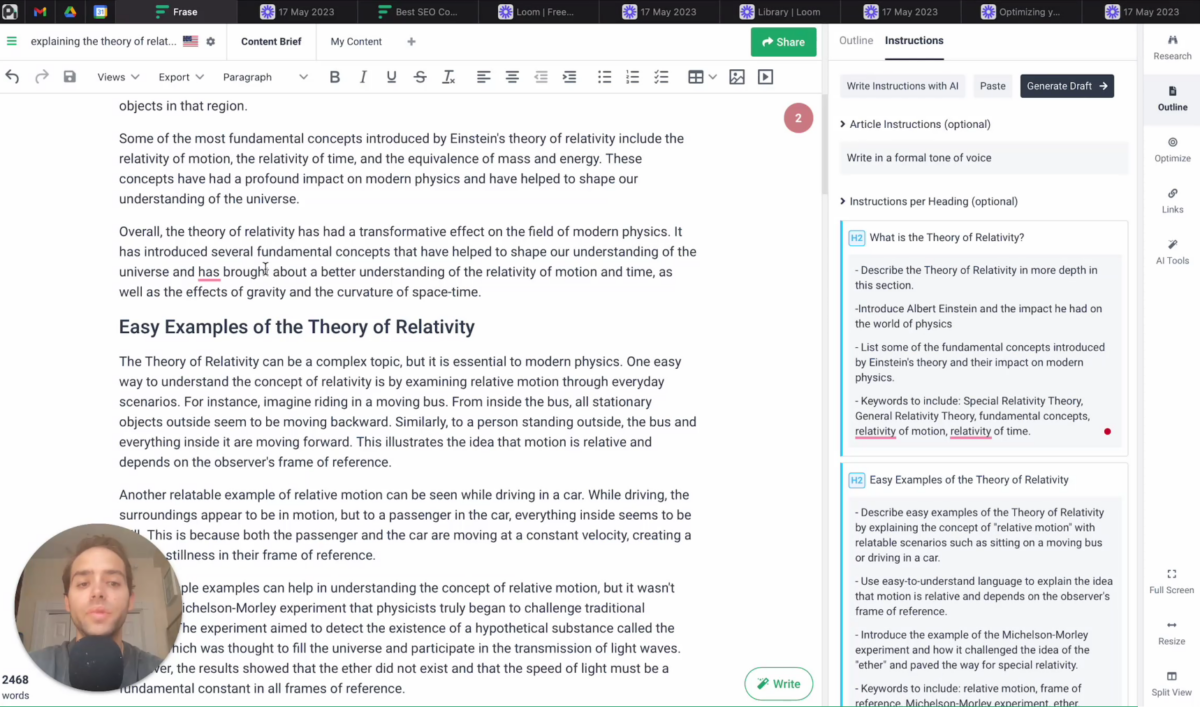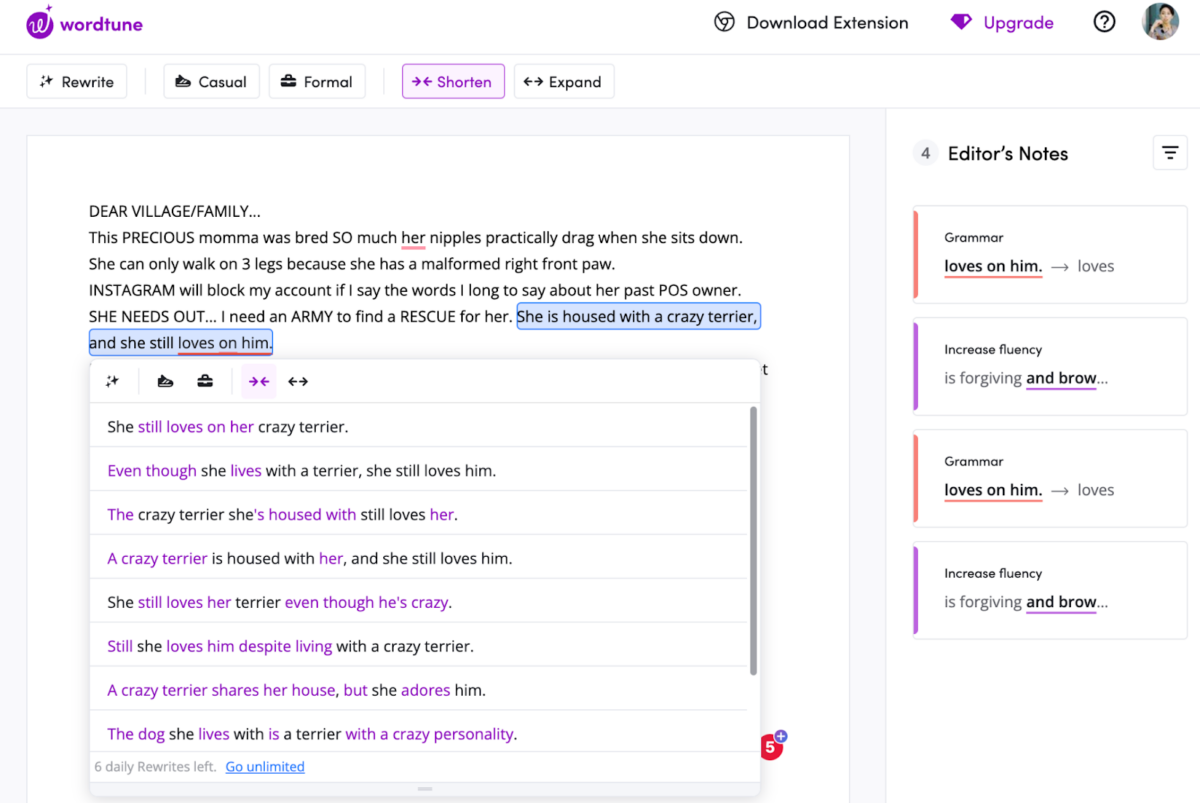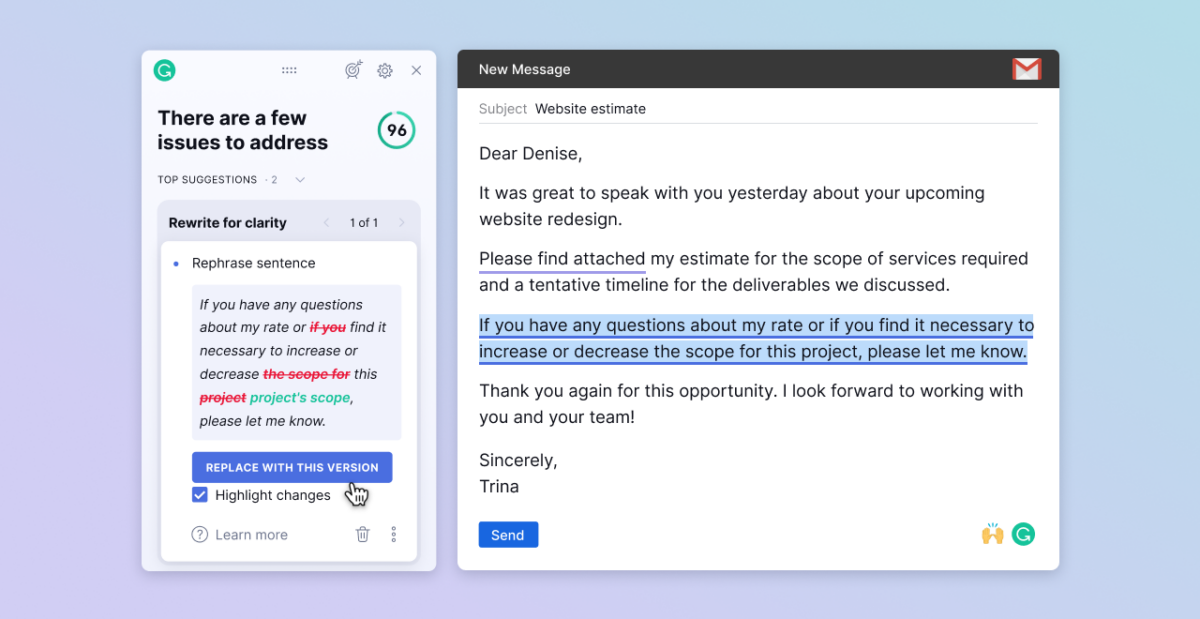
15 Powerful AI Blog Writers (When You Need Help Blogging)
If you’ve been experiment with Generative AI tools like ChatGPT or Google Bard, you probably already understand the power of AI to help you take ideas and build content from them. Maybe you have used them like a search engine, asking questions to get ideas, or even to create an email for you. But have you ever considered using an AI blog writer, having artificial intelligence write a complete blog post for you?
Most of my friends in marketing and savvy entrepreneurs I know try to use advanced software for just about any promotional activity, including content creation. Well, what about using the same types of tools to help write blog posts? With an AI blog writer, you can generate comprehensive articles for your website without wasting too much time or company resources.
Let me guide you through an explanation as to what exactly is an AI blog writer, how they can help you, and then, I’ll list the best software from this category. Don’t be surprised if some of these programs become the backbone of your future content creation efforts!
What is an AI Blog Writer?
I assume you already know what AI writing tools are. What makes these content generators so incredible is the fact they can pump out thousands of words within a few minutes with minimal human interface. The tools rely on natural language processing and artificial intelligence to “scan” online posts and create original content based on everything posted on the Internet.
Despite a few obvious benefits, AI-generated content has caused quite a stir within the digital marketing world. Many experts consider these tools a form of cheating that brings down all content posted on the web. AI is also known to have hallucinations and create content that might not be factually correct. There might also be some inherent biases in the content created by AI. On the other hand, there are many who welcome these advances in technology as a way to improve content marketing processes and overall blogging productivity.
Should I Use an AI Blog Writer?
Obviously, let me be clear in saying that I do NOT use AI blog writers. Still, I understand why some companies and content writers would use these platforms. AI-content generation tools are perfect for foreigners where English is not their first language but they want to share their opinions online, in American publications, or in comment threads. They’re also fantastic for those who want to produce long-form content but aren’t necessarily good writers or have a problem explaining their ideas concisely.
Unfortunately, using this type of software is a slippery slope. We don’t know much about the long-term impact of using a content creation tool for our daily blogging. Specifically, there are all sorts of questions as to how Google and other search engines perceive these posts and whether they’ll hit you with a massive penalty.
Therefore, my mission is not to tell you you have to do this or that, but to let you understand what technology is out there that your competitors might already be using, and give you the opportunity to make an educated decision on which direction you might want to go.
With that out of the way, let’s begin the list of recommended tools!
15 AI Blog Writers to Check Out
Whatever the case might be, I still suggest you check out an understand what is out there in terms of AI blog writing technology. Even if you don’t use them to create blog posts from scratch, they might assist you with other tasks, such as rewriting awkwardly-sounding paragraphs, or helping you flesh out outlines for your next blog post.
Writesonic

If you’re looking to create high-quality content but don’t have the resources to create it yourself, I suggest trying out Writesonic. This content writing tool is among the best in its class, allowing you to generate long-form articles, product descriptions, and all sorts of other marketing materials. The tool also comes with an image generator, which can be perfect for social media and websites.
However, the thing I like the most about the software is its content ideas generator. Writesonic’s AI is second to none, and you can use it to brainstorm incredible landing pages for your site. By implementing tone of voice into your pieces, you can be certain that each post will look like the previous one. That way, even if you change team members, you can be certain that your branding won’t suffer.
Jasper

My main issue with some of these tools is that they’re not that reliable, which is why I liked Jasper AI so much. The platform uses several language models, which is a major step forward compared to Chat GPT-4. By combining several technologies, you can generate much better marketing content without losing meaning in the process.
You can integrate this powerful tool with just about any other online SaaS platform. During my short use, I mixed it with my WordPress and Gmail, simplifying my daily communication with partners and other stakeholders. When talking about blog posts, in particular, human writers can benefit a lot from its SurferSEO integration, which allows you to improve content optimization on the fly.
Further Reading: Blogging vs Vlogging: Which Should You Do?
Copy.ai

Similar to Jasper AI, this AI blog writer tool relies on mixed technology to deliver high-quality marketing content to its users. Aside from creating blog outlines, the AI-powered tool can work for just about any type of content, from social media content to sales copies and emails. Each piece of content can be adjusted for a different tone of voice and language.
The software squeezes data from its infobase to adjust content output so it better fits your brand message. The reason why I usually recommend Copy AI to my friends is because it’s one of the rare tools that comes with a free, unlimited plan. You don’t need to leave a credit card or any of that nonsense; just log in with your Chrome and start automating your content creation process the same day.
Rytr

If you’re looking to generate blog articles and boost search engine rankings, Rytr will quickly become your best buddy. With its SERP analysis feature, content marketers can quickly check how their posts are scaling compared to other blogs in Google and make the necessary adjustments. As if that wasn’t enough, you can also tinker with the keyword research function to discover fresh ideas.
The thing I appreciate the most is that you can set a creativity level for your writing process. Go with silly, awkward-sounding posts or stick with stiff, marketing-focused material. Rytr also has a Google Chrome browser extension and a few integrations that allow you to generate human-like text in Messenger, email, and other communication platforms.
Further Reading: 15 Best AI Email Writers to Check Out
Is Your LinkedIn Working?
Just released: my new book to help professionals, entrepreneurs, and business owners maximize LinkedIn for real growth.
With years of LinkedIn expertise, Maximizing LinkedIn for Business Growth offers actionable steps to build your brand, expand your network, and drive results.
Start leveraging LinkedIn like never before—grab your copy now! Click the cover or button below to buy on Amazon.
AI Writer

Like many other content tools on this list, AI Writer only comes with premium plans. Nevertheless, based on my experience, this software will be more than worth the investment. The app is ideal for articles, but it might also provide limited use for product descriptions and social media posts.
One of the best things about the software is that all content briefs come with citations. You can easily check the sources that the app used and further polish the information within the piece. With AI Writer and its editing suite, you can also generate fantastic SEO-optimized content for your marketing campaigns.
Scalenut

As a fanatical digital marketer, I try to optimize just about any piece of text I post online. So, it makes sense that Scalenut is one of my favorite tools for content writing. Besides generating articles within seconds, the software has numerous features that would allow you to improve those posts for search engines.
You can use this app to create content plans, research topics, and gather data for different keywords. Scalenuit is a perfect tool for creating topic clusters from scratch, while its optimizing features are remarkably similar to that of SurferSEO. Later on, you can check the blog posts for traffic, CTR, and other relevant metrics.
Further Reading: 13 Helpful AI Writing Assistant to Increase Your Work Efficiency
INK

In many ways, INK reminds me of the previously mentioned Scalenut. The software is fantastic for keyword research, allowing you to tweak the main keywords, target audience, and objectives for each piece. After gathering the initial data, you can start creating topic clusters that will boost articles’ placement within Google.
Faulty SEO optimizers are one of my pet peeves. Despite the fact there are so many of these tools on the market, only a few of them do their job. Luckily, INK seems pretty good at boosting your optimization effort and finding relevant SEO keywords. I also like the integrated grammar checkers that allow you to finish the entire process within the same dash.
Frase

Speaking of good optimization apps, Frase should be at the top of every marketer’s list. I use this software to create blog outlines for my articles, and then I use its optimization feature to boost their placement in Google. Even if you’re a complete newbie, you should get quickly used to basic functionality, which is another major perk.
Frase also has an AI writing assistant that allows you to generate posts within seconds. While this isn’t my fave AI blog writer, the combined optimization features and article creation will make it your go-to blogging software.
Further Reading: My 15 Recommended AI Writer Tools
Quillbot

The thing that initially attracted me to this app is its comprehensive functionality. Aside from your usual generation feature, the software also has grammar and plagiarism checkers, a summarizer, a translator, and a few other goodies.
Basically, you can streamline the entire process from one dash without having to jump through extra hoops. Also, did I mention you can integrate the platform with Microsoft Word, Google Chrome, and macOS?
Wordtune

Just a few months back, Wordtune was a small, nifty platform that you could use for basic AI editing. However, the creators did lots of work on the software, adding numerous functionalities. You can nowadays streamline the entire content creation process from one dash with minimal effort.
Aside from automated suggestions, you also have all sorts of templates at your disposal. Wordtune allows you to add jokes and statistical data, further refining the piece.
Further Reading: 15 Amazing AI Paragraph Rewriter Tools
Article Forge

While not my first choice, I do understand why many people are captivated by Article Forge. The tool is rather straightforward and can generate comprehensive pieces with minimal human input. For the most part, all you need to do is input your main keyword, article length, and language and watch as the platform does its magic.
ChatGPT

ChatGPT is the big daddy of all content generators. Created by OpenAI, this technology is nowadays being implemented in various other platforms, like Jasper. So, don’t be surprised if you notice that several tools provide similar outputs.
Keep in mind that ChatGPT isn’t your best bet if you’re looking to generate quality AI pieces. Nevertheless, the fact it’s completely free gives it a headstart over some better, more comprehensive programs. In the worst-case scenario, you can at least tinker a bit with the app to learn more about the underlying technology.
Further Reading: Top 21 AI Podcasting Tools for Editing, Marketing, and Enhancing Your Show
WordAI

Despite not having the traditional AI content generation feature, WordAI can still do a lot of good things for your marketing team. The software allows you to enrich any text, restructure sentences, improve quality and clarity, and split content. The best thing yet is that all new pieces are completely original and can pass major checkers.
Copysmith

Copysmith is one of the best SEO tools on the market for product descriptions and other eCommerce content. Most notably, the platform allows you to bulk-transfer dozens and dozens of articles in the dash, making it a perfect solution for web shops that have been in the business for a while.
The software also comes with a fair share of integrations, allowing you to combine content generation with Shopify’s, Amazon’s, and Wix’s functionality. Aside from creating awesome posts, Copysmith allows you to benchmark your content against top competitors in Google.
Grammarly

Grammarly is the alpha and omega among grammar tools. Basically, if you’re using any other software to check text for accuracy, you’re doing things the wrong way.
Like most other platforms, Grammarly has adapted to the new AI market requirements. It has recently introduced a content generator that works within the old dash. That way, while checking your blog posts for quality and consistency, you can also pump out new paragraphs and sections with minimal effort.
Longshot

One of the things that Longshot excels at is catching the latest trends. This tool curates the latest articles from the Internet to generate timely and relevant posts for your blog. There’s also a cool fact-checking functionality that ensures each piece is on point and factually correct.
I also have to give props to the semantic SEO feature. While the function can’t compare to some of the best SEO tools, it’s still a nice thing to have in your arsenal of tools. I’ve tried it a few times and it can provide a major boon to your marketing campaigns.
GrowthBar

I’m not sure whether to call GrowthBar a content generator or an SEO suite of tools. The software definitely does a great job creating engaging articles, but it also has numerous optimization features that can further boost your SEO efforts. For example, it gives you a breakdown of relevant keywords, optimal content structure, and SEO metrics for your content.
All in all, the software isn’t a bad investment if you have nothing in your toolbox. Then again, you’ll likely get better results if you just use a high-tier SEO tool and a good content generator.
Further Reading: 15 AI SEO Software Tools to Help Your Content Rank
Conclusion on AI Blog Writers
Even if you’re not into AI generators, you have to admit that these tools can be potent allies in your journey to perfect blog post optimization. Not only can they create engaging, relevant content for your blog and other channels, but they also ensure that each piece is properly modified for search engines.
That being said, remember that if your purpose of blogging is for search engine optimization, we still don’t know what the long-term impact might be. AI also can’t tell stories, provide creative and unique perspectives, share your unique experiences and expertise, and generate emotional attachment like human writers can, and at the end of the day, the content that is most engaging will keep people on your website longer and lead to higher search engine rankings.
Further Reading: AI Content Assistants: 13 Tools to Assist in Your Content Creation








